Meet The Man Believed To Be The First Black Millionaire In Texas
(KERA) William Madison McDonald is far from a household name these days, but he was a legend in his day. Born 150 years ago, McDonald is widely believed to have been the first black millionaire in Texas.
The son of a former slave, McDonald became an influential banker and a political force who helped shape Fort Worth at the turn of the 20th century, using his wealth and connections to help lift up his city’s African-American community.
“When I was young growing up, Bill McDonald was a mythical character. But we knew he was real … we knew he was buried, for example. We knew he had lived and been buried. But he was larger than life,” said Bob Ray Sanders, a retired Fort Worth Star-Telegram columnist and former KERA newsman.
When Sanders was growing up in the 1950s and early ‘60s, the east side of Fort Worth’s downtown was the place to be. The intersection of Jones Street and Ninth Street, Sanders said, was the heart of a thriving black business district in the still-segregated city that thronged with African-American-owned restaurants, hotels, night clubs, shops and even a hospital. (read more and listen to the KERA news story)
Site of McAllen church for African-Americans receives historical recognition from state
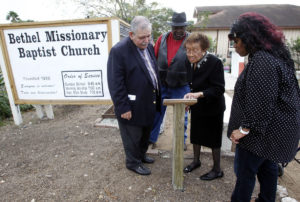 (McAllen Monitor) Even in an area like the Rio Grande Valley that has a majority-minority population, there is history of segregation. On Martin Luther King Jr. Day, the state honored one of the few places designated for African-Americans in the Valley.
(McAllen Monitor) Even in an area like the Rio Grande Valley that has a majority-minority population, there is history of segregation. On Martin Luther King Jr. Day, the state honored one of the few places designated for African-Americans in the Valley.
Little Bethel Baptist Church was founded in 1936 by Eugene and Georgia Hubbard after they couldn’t find any churches for African-Americans in McAllen. The location is 1322 S. 16th St. and Booker T. Ave. in the La Paloma neighborhood.
Across the corner was Booker T. Washington School, built around 1942, which was the only school that provided high school education to African-Americans in the area. (read more)
Musical theater performance among events planned for LSC-Kingwood Black History Month
 Lone Star College-Kingwood has a dynamic line-up of free events planned in observance of Black History Month this February.
Lone Star College-Kingwood has a dynamic line-up of free events planned in observance of Black History Month this February.
Coordinated by the Kingwood campus’ Intercultural Center and Office of Student Life, LSC-Kingwood’s Black History Month initiatives are open to students, staff and community members interested in expanding their knowledge and appreciation of African-American culture and historical contributions.
“We open this to the community because we are a community college and we are dedicated to serving everyone,” said Kristen Johnson, intercultural program coordinator. “We want to ensure we are educating people and making them aware of the history of the United States. The more knowledge people have of history, the better we can raise productive, culturally competent citizens.”
The centerpiece of this year’s programs is the Ensemble Theater‘s production of the musical “Mahalia” Thursday, Feb. 7, in the LSC-Kingwood Music Building Recital Hall at 7:30 p.m. Admission is free, but limited to the first 200 people. Doors will open at 7 p.m. (read more)
TIPHC Bookshelf
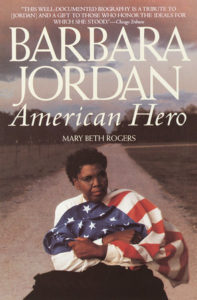 Published scholarship on black history in Texas is growing and we’d like to share with you some suggested readings, both current and past, from some of the preeminent history scholars in Texas and beyond. We invite you to take a look at our bookshelf page — including a featured selection — and check back as the list grows. A different selection will be featured each week. We welcome suggestions and reviews. This week, we offer, “Barbara Jordan, American Hero,” by Mary Beth Rogers.
Published scholarship on black history in Texas is growing and we’d like to share with you some suggested readings, both current and past, from some of the preeminent history scholars in Texas and beyond. We invite you to take a look at our bookshelf page — including a featured selection — and check back as the list grows. A different selection will be featured each week. We welcome suggestions and reviews. This week, we offer, “Barbara Jordan, American Hero,” by Mary Beth Rogers.
Barbara Jordan was the first African American to serve in the Texas Senate since Reconstruction, the first black woman elected to Congress from the South, and the first to deliver the keynote address at a national party convention. Yet Jordan herself remained a mystery, a woman so private that even her close friends did not know the name of the illness that debilitated her for two decades until it struck her down at the age of fifty-nine.
In “Barbara Jordan,” Mary Beth Rogers deftly explores the forces that shaped the moral character and quiet dignity of this extraordinary woman. She reveals the seeds of Jordan’s trademark stoicism while recapturing the essence of a black woman entering politics just as the civil rights movement exploded across the nation. Celebrating Jordan’s elegance, passion, and patriotism, this illuminating portrayal gives new depth to our understanding of one of the most influential women of our time-a woman whose powerful convictions and flair for oratorical drama changed the political landscape of America’s twentieth century.
This Week In Texas Black History, Jan. 15-21
 16 – Debbie Allen, actress, director, producer and choreographer, was born on this date in 1950 in Houston. Allen graduated from Jack Yates High School in Houston. In 1989, she became the first African American woman hired by a television network as a director in prime time for the show, “Fame, ” for which she also won an Emmy in 1982 for Best Choreography. She also produced and directed the TV show “A Different World,” and was producer for the 1997 film “Amistad.” She has twice been nominated for Tony Awards — 1980, as Best Actress, “West Side Story”; 1986, as Best Actress (Musical), “Sweet Charity.”
16 – Debbie Allen, actress, director, producer and choreographer, was born on this date in 1950 in Houston. Allen graduated from Jack Yates High School in Houston. In 1989, she became the first African American woman hired by a television network as a director in prime time for the show, “Fame, ” for which she also won an Emmy in 1982 for Best Choreography. She also produced and directed the TV show “A Different World,” and was producer for the 1997 film “Amistad.” She has twice been nominated for Tony Awards — 1980, as Best Actress, “West Side Story”; 1986, as Best Actress (Musical), “Sweet Charity.”
 16 – On this day in 1943, Major General Marcelite Harris was born in Houston. She became the U. S. Air Force’s first African-American female general on May 1, 1991. Among her many other “firsts,” she was also the first woman aircraft maintenance officer, one of the first two women air officers commanding at the U.S. Air Force Academy, and the first woman deputy commander for maintenance. She attained the rank of major general and was the highest ranking woman in the U.S. Air Force and the highest ranking black woman in the Department of Defense when she retired in 1997. She is the great granddaughter of I.M. Terrell, founder of the first school for blacks in Fort Worth.
16 – On this day in 1943, Major General Marcelite Harris was born in Houston. She became the U. S. Air Force’s first African-American female general on May 1, 1991. Among her many other “firsts,” she was also the first woman aircraft maintenance officer, one of the first two women air officers commanding at the U.S. Air Force Academy, and the first woman deputy commander for maintenance. She attained the rank of major general and was the highest ranking woman in the U.S. Air Force and the highest ranking black woman in the Department of Defense when she retired in 1997. She is the great granddaughter of I.M. Terrell, founder of the first school for blacks in Fort Worth.
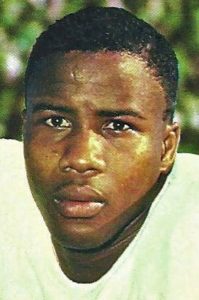 16 – Paul Gipson, University of Houston running back great, died at age 38 of a heart attack on this day in 1985 in Houston. Gipson had been the school’s all-time rushing leader (2,769 yards) and was a two-time All-America selection. He helped the Cougars to a 13-5-2 record and a pair of Top-20 national rankings during his final two seasons. He helped lead Houston to a No. 2 national ranking in 1967, the highest ranking in school history.
16 – Paul Gipson, University of Houston running back great, died at age 38 of a heart attack on this day in 1985 in Houston. Gipson had been the school’s all-time rushing leader (2,769 yards) and was a two-time All-America selection. He helped the Cougars to a 13-5-2 record and a pair of Top-20 national rankings during his final two seasons. He helped lead Houston to a No. 2 national ranking in 1967, the highest ranking in school history.
17 – Tillotson Collegiate and Normal Institute began education classes on this date in 1881 in Austin. The school was chartered by the American Missionary Society of Congregational Churches and its namesake, George Jeffrey Tillotson, a Yale graduate and congregational minister from Connecticut. The school merged with Samuel Huston College in 1952 to form Huston-Tillotson College.
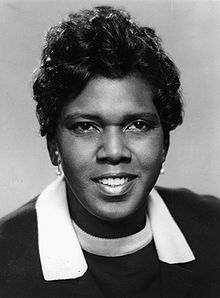 17 – On this day in 1996, U.S. Congressman and educator Barbara Jordan died in Austin at age 59 from pneumonia and leukemia. A Houston native and graduate of Phillis Wheatley High School, Jordan was elected to the U. S. House of Representatives from the Eighteenth Texas District in 1973, becoming the first Black woman from a Southern state to serve in Congress. Jordan received the Presidential Medal of Freedom in 1994, and held the Lyndon Baines Johnson Public Service Professorship at the LBJ School of Public Affairs, University of Texas at Austin. (See TIPHC Bookshelf for “Barbara Jordan, American Hero.”)
17 – On this day in 1996, U.S. Congressman and educator Barbara Jordan died in Austin at age 59 from pneumonia and leukemia. A Houston native and graduate of Phillis Wheatley High School, Jordan was elected to the U. S. House of Representatives from the Eighteenth Texas District in 1973, becoming the first Black woman from a Southern state to serve in Congress. Jordan received the Presidential Medal of Freedom in 1994, and held the Lyndon Baines Johnson Public Service Professorship at the LBJ School of Public Affairs, University of Texas at Austin. (See TIPHC Bookshelf for “Barbara Jordan, American Hero.”)
 18 — Major League Baseball player Curt Flood was born on this day in Houston in 1938. Flood’s antitrust litigation in 1970-71 challenging the major leagues’ reserve clause was unsuccessful, however, it led ultimately to the clause’s demise and ushered in the era of free agency for pro athletes. Flood grew up in California and signed his first professional contract while still a senior at Oakland Technical High School. He played for the St. Louis Cardinals from 1958 to 1969 season as one of the league’s best center fielders. He batted over .300 in six seasons and had a career average (1956–71) of .293. At one time, he played in 226 consecutive games without committing an error and in 1966 was errorless for the entire season. He won seven consecutive Gold Gloves for defensive excellence. He received the NAACP Jackie Robinson Award for contributions to black athletes in 1992. His autobiography, The Way It Is, outlined his moral and legal objections to baseball’s reserve system. The book is considered required reading in the history of baseball’s labor movement.
18 — Major League Baseball player Curt Flood was born on this day in Houston in 1938. Flood’s antitrust litigation in 1970-71 challenging the major leagues’ reserve clause was unsuccessful, however, it led ultimately to the clause’s demise and ushered in the era of free agency for pro athletes. Flood grew up in California and signed his first professional contract while still a senior at Oakland Technical High School. He played for the St. Louis Cardinals from 1958 to 1969 season as one of the league’s best center fielders. He batted over .300 in six seasons and had a career average (1956–71) of .293. At one time, he played in 226 consecutive games without committing an error and in 1966 was errorless for the entire season. He won seven consecutive Gold Gloves for defensive excellence. He received the NAACP Jackie Robinson Award for contributions to black athletes in 1992. His autobiography, The Way It Is, outlined his moral and legal objections to baseball’s reserve system. The book is considered required reading in the history of baseball’s labor movement.
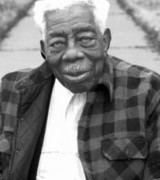 18 – On this date in 1898, George Dawson was born in Marshall. The grandson of a slave, Dawson was one of the oldest men in America to learn to read and write a book, after he entered a literacy program in Dallas at age 98. Dawson published his autobiography, “Life is So Good,” in 2000 at age 102.
18 – On this date in 1898, George Dawson was born in Marshall. The grandson of a slave, Dawson was one of the oldest men in America to learn to read and write a book, after he entered a literacy program in Dallas at age 98. Dawson published his autobiography, “Life is So Good,” in 2000 at age 102.
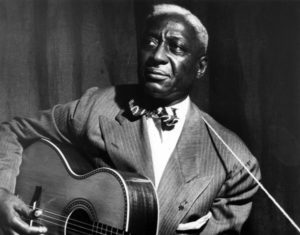 20 – On this day in 1889 musician Huddie “Lead Belly” Ledbetter was born in Mooringsport, Louisiana (near Shreveport). Known as the “King of the 12-String Guitar,” he wrote children’s songs, field songs, ballads, square dance songs, prison songs, folk songs, and blues. He was five when his family settled in Bowie County. He picked up the nickname either as a play on his last name or as the result of being shot in the stomach with buckshot. Lead Belly’s song catalog consisted of well over 500 songs, including “Midnight Special,” “Kisses Sweeter than Wine,” and “Rock Island Line.” In 1950, The Weavers, a folk quartet, recorded a version of Lead Belly’s “Good Night, Irene” that spent 25 weeks on the Billboard charts, peaking at No. 1.
20 – On this day in 1889 musician Huddie “Lead Belly” Ledbetter was born in Mooringsport, Louisiana (near Shreveport). Known as the “King of the 12-String Guitar,” he wrote children’s songs, field songs, ballads, square dance songs, prison songs, folk songs, and blues. He was five when his family settled in Bowie County. He picked up the nickname either as a play on his last name or as the result of being shot in the stomach with buckshot. Lead Belly’s song catalog consisted of well over 500 songs, including “Midnight Special,” “Kisses Sweeter than Wine,” and “Rock Island Line.” In 1950, The Weavers, a folk quartet, recorded a version of Lead Belly’s “Good Night, Irene” that spent 25 weeks on the Billboard charts, peaking at No. 1.
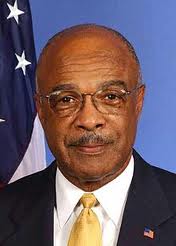 20 – Rod Paige was confirmed as the U.S. Secretary of Education on this date 2001, making Paige the first African-American secretary of education. Though from Monticello, Mississippi, Paige served for a decade as Dean of the College of Education at Houston’s Texas Southern University, after serving as the school’s athletic director. He also had a stint as the Tigers head football coach. From 1994-2001, he served as superintendent of the Houston Independent School District.
20 – Rod Paige was confirmed as the U.S. Secretary of Education on this date 2001, making Paige the first African-American secretary of education. Though from Monticello, Mississippi, Paige served for a decade as Dean of the College of Education at Houston’s Texas Southern University, after serving as the school’s athletic director. He also had a stint as the Tigers head football coach. From 1994-2001, he served as superintendent of the Houston Independent School District.
 21 – On this day in 1922, George McJunkin died in Folsom, New Mexico. Born a slave in Midway, Texas, McJunkin is credited with one of the most significant finds in archeological history, “Folsom Man.” A cowboy and amateur archeologist, McJunkin was inspecting damage on the Crowfoot Ranch, where he was foreman, after a 1908 flood when he discovered bison bones. He realized the find was significant but no experts would look at his discovery until after his death in 1922. The remains were part of a Paleo-Indian site dating back as far as 9000 BCE, where ancient bison had been killed by early Indians using special tools, now referred to as Folsom points. With this find, scientists were able to establish a human presence in North America about 7,000 years earlier than had previously been thought. The site eventually yielded human remains that became known as “Folsom Man.”
21 – On this day in 1922, George McJunkin died in Folsom, New Mexico. Born a slave in Midway, Texas, McJunkin is credited with one of the most significant finds in archeological history, “Folsom Man.” A cowboy and amateur archeologist, McJunkin was inspecting damage on the Crowfoot Ranch, where he was foreman, after a 1908 flood when he discovered bison bones. He realized the find was significant but no experts would look at his discovery until after his death in 1922. The remains were part of a Paleo-Indian site dating back as far as 9000 BCE, where ancient bison had been killed by early Indians using special tools, now referred to as Folsom points. With this find, scientists were able to establish a human presence in North America about 7,000 years earlier than had previously been thought. The site eventually yielded human remains that became known as “Folsom Man.”
 21 – On this date in 2007, Lovie Smith of Big Sandy, Texas became the first African-American professional head football coach to qualify a team for the NFL’s Super Bowl. Smith’s Chicago Bears beat the New Orleans Saints, 39-14, in the NFC championship game. Smith led the Big Sandy Wildcats to three consecutive state championships in high school and was all-state three times as an end and linebacker.
21 – On this date in 2007, Lovie Smith of Big Sandy, Texas became the first African-American professional head football coach to qualify a team for the NFL’s Super Bowl. Smith’s Chicago Bears beat the New Orleans Saints, 39-14, in the NFC championship game. Smith led the Big Sandy Wildcats to three consecutive state championships in high school and was all-state three times as an end and linebacker.
Blog: Ron Goodwin, author, PVAMU history professor
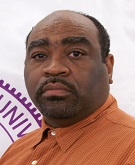 Ron Goodwin’s bi-weekly blog appears exclusively for TIPHC. Goodwin is a San Antonio native and Air Force veteran. Generally, his column addresses contemporary issues in the black community and how they relate to black history. He and the TIPHC staff welcome your comments.
Ron Goodwin’s bi-weekly blog appears exclusively for TIPHC. Goodwin is a San Antonio native and Air Force veteran. Generally, his column addresses contemporary issues in the black community and how they relate to black history. He and the TIPHC staff welcome your comments.
Read his latest entry, “Misc. musings,” here.
Submissions Wanted
Historians, scholars, students, lend us your…writings. Help us produce the most comprehensive documentation ever undertaken for the African American experience in Texas. We encourage you to contribute items about people, places, events, issues, politics/legislation, sports, entertainment, religion, etc., as general entries or essays. Our documentation is wide-ranging and diverse, and you may research and write about the subject of your interest or, to start, please consult our list of suggested biographical entries and see submission guidelines. However, all topics must be approved by TIPHC editors before beginning your research/writing.
We welcome your questions or comments via email or telephone – mdhurd@pvamu.edu.
